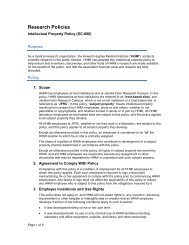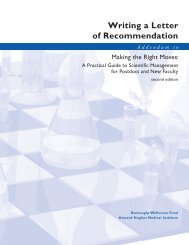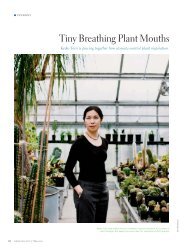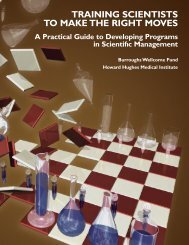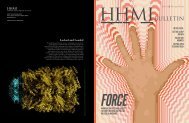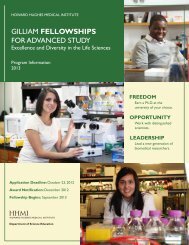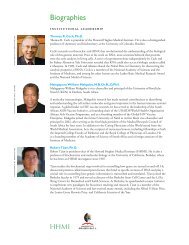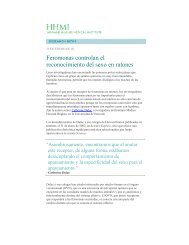Download PDF of this Story - Howard Hughes Medical Institute
Download PDF of this Story - Howard Hughes Medical Institute
Download PDF of this Story - Howard Hughes Medical Institute
Create successful ePaper yourself
Turn your PDF publications into a flip-book with our unique Google optimized e-Paper software.
Erin O’Shea does not waste time. She<br />
finished a Ph.D. in two and a half<br />
years, rose from novice to world champion<br />
dog trainer in under three, and, at age 47, is moving into an<br />
executive leadership role at HHMI.<br />
The eldest <strong>of</strong> five children, O’Shea is just six years older<br />
than her youngest sibling Meggan. Both women describe their<br />
middle class upbringing in western New York as happy and ordinary.<br />
Their father ran a residential contracting business, and<br />
their mother left a career in physical therapy to run the household.<br />
All the O’Shea kids performed well in school and excelled<br />
as athletes.<br />
But there was something different about Erin. “She was<br />
intensely focused, much more so than the rest <strong>of</strong> us,” says Meggan<br />
O’Shea. “With Erin it’s always been, she’s going to do what she<br />
wants to do, she’ll do it very, very well, and she’ll do it fast.”<br />
Andrew Murray, a longtime colleague <strong>of</strong> O’Shea’s, puts it<br />
another way: “Soon after people meet Erin, if you were to ask<br />
them how fast <strong>this</strong> woman could gnaw through a quarter-inch bar<br />
<strong>of</strong> steel, they’d be like, ‘oh, probably 90 seconds.’” After hearing<br />
O’Shea present her research as a graduate student, Murray was so<br />
impressed he helped recruit her to the University <strong>of</strong> California,<br />
San Francisco (UCSF), and later to Harvard University, where<br />
she’s been since 2005.<br />
O’Shea, an HHMI investigator since 2000, maintains a prolific<br />
research lab focused on understanding how cells sense and<br />
respond to their environment. Her contributions range from discovering<br />
how single cells adapt at the molecular level to changing<br />
levels <strong>of</strong> light and stress to analyzing randomness in gene expression<br />
patterns. Her work has advanced the broad understanding <strong>of</strong><br />
basic biological mechanisms and helped scientists studying cell<br />
growth patterns in cancer and other diseases.<br />
In July, O’Shea will become vice president and chief scientific<br />
<strong>of</strong>ficer at HHMI, moving with her husband Douglas Jeffery<br />
to Chevy Chase, Maryland, where HHMI is headquartered. She<br />
views the job as both an opportunity to do something new and as<br />
a natural extension <strong>of</strong> her past work—as a scientist, administrator,<br />
mentor, and educator.<br />
Influencing Undergrads<br />
By the time O’Shea joined Harvard, she felt an obligation to give<br />
back to the scientific community by training and educating the<br />
next generation <strong>of</strong> researchers. As director <strong>of</strong> Harvard’s Faculty <strong>of</strong><br />
Arts and Sciences (FAS) Center for Systems Biology, O’Shea has<br />
recruited and mentored many junior faculty. With a tight-knit<br />
group <strong>of</strong> colleagues, she created an innovative undergraduate<br />
science course.<br />
“A lot <strong>of</strong> people with her level <strong>of</strong> accomplishment are not<br />
great listeners, but she’s interested in people and makes time<br />
for them,” says Dan Kahne, a Harvard chemistry pr<strong>of</strong>essor who<br />
created the course Life Sciences 1A with O’Shea and four other<br />
faculty members. “With students, that’s very important. It doesn’t<br />
have to be all about her.”<br />
The enormously popular course is a matter <strong>of</strong> pride for Kahne,<br />
O’Shea, and the others on the faculty team. They present science<br />
as a detective story at the intersection <strong>of</strong> chemistry and biology—<br />
the two disciplines that drive progress in the life sciences today.<br />
Students explore a handful <strong>of</strong> experimental case studies rather<br />
than a body <strong>of</strong> facts and prefabricated lab exercises. The course<br />
draws more than 500 students a year, and O’Shea reports that the<br />
number <strong>of</strong> life science majors at Harvard has grown by 40 percent<br />
since its inception.<br />
“We choose topics that capture students’ interest and motivate<br />
them to learn the underlying detail,” she says. “We tell them<br />
like mystery novels with a thread that hooks them all together.”<br />
O’Shea keeps regular <strong>of</strong>fice hours for her undergraduate students,<br />
meeting with them one on one and <strong>of</strong>ten helping them<br />
find research positions in labs.<br />
“I came to Harvard in part because I wanted to teach undergraduates,<br />
because the people who taught me at that stage <strong>of</strong> my<br />
education had a big influence on my career,” she says.<br />
Sparks <strong>of</strong> Interest<br />
As a high school student in Leroy, New York, O’Shea enjoyed<br />
learning about science but envisioned herself as a veterinarian<br />
or doctor. It wasn’t until her sophomore year at Smith College<br />
in Northampton, Massachusetts, that she learned what it meant<br />
to do science. She began conducting research on catalysts in an<br />
inorganic chemistry lab and was allured by firsthand discovery.<br />
“I was excited to be doing something where, unlike the science<br />
course labs I’d had before, we didn’t know the answer. We<br />
were actually finding the answer,” she says.<br />
Her famous focus kicked in. “There was a pretty marked<br />
change in her,” says her sister Meggan. “She had found something<br />
that she loved and put all her energy into it. By the second<br />
"I wanted to teach<br />
undergraduates<br />
because the people who<br />
taught me at that stage<br />
<strong>of</strong> my education had<br />
a big influence on my<br />
career." – erin o'shea<br />
26 h h m i b u l l e t i n | Spring 2o13




